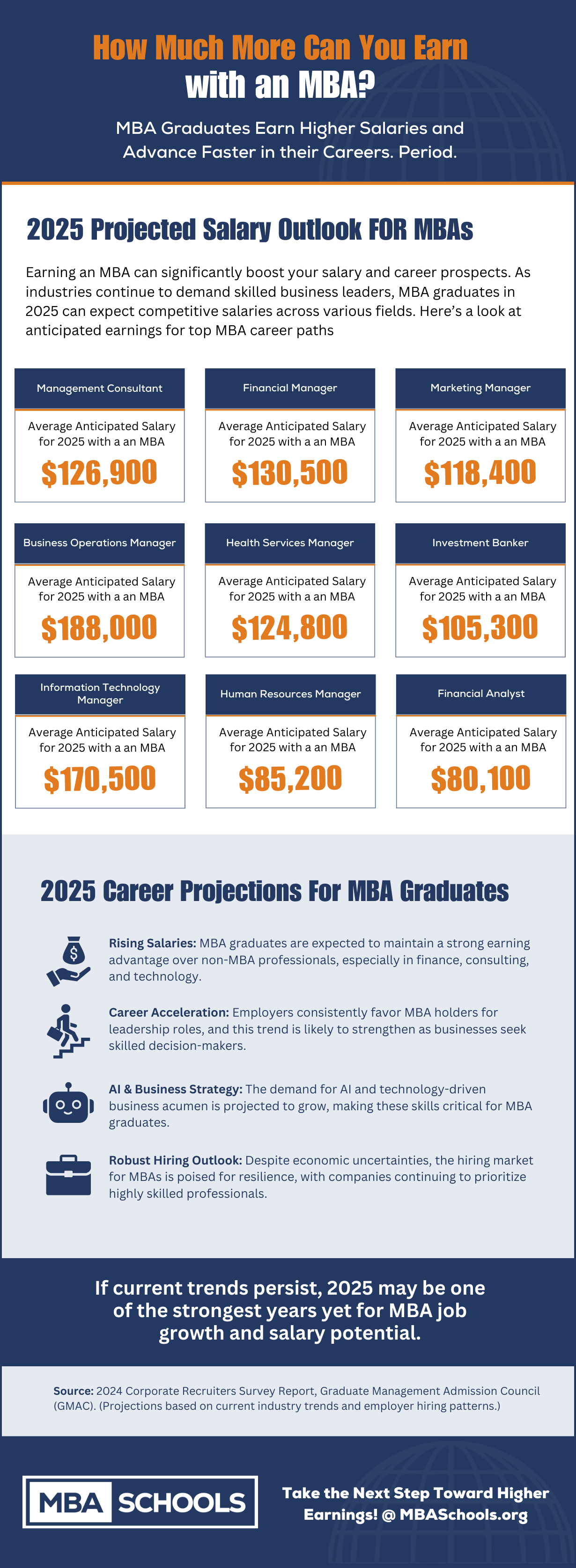MBA Career Paths and Salaries in 2025 [Infographic]
Table of Contents
Key Roles for MBA Graduates
Blink and 2025 will be gone. As we approach 2025, it’s imperative to understand the dynamic landscape of MBA career paths and salaries. In this infographic, I’ll guide you through the diverse opportunities available after earning your MBA, highlighting key industries, roles, and salary expectations that can shape your career decisions. By exploring this data, you can gain valuable insights that will empower you to navigate your career journey effectively and make informed choices that align with your professional aspirations.
Key Takeaways:
- Diverse MBA Career Options: Graduates can pursue a wide array of fields, including finance, consulting, marketing, and operations, showcasing the versatility of an MBA.
- Growing Demand: Industries such as technology and healthcare increasingly value MBA degrees, leading to heightened job opportunities and competitive salaries.
- Salary Trends: MBA graduates in 2025 can expect significant salary increases, with average starting salaries projected to be higher than in previous years.
- Geographic Variations: Salaries and job availability may vary greatly depending on location, with metropolitan areas often offering more lucrative options.
- Long-Term ROI: The investment in an MBA continues to show strong returns over time, particularly for those who effectively leverage networking and career services.

Embed This Infographic Into Your Article
Click the button to copy the embed code.
Overview of MBA Career Paths
While the business world continues to evolve, pursuing an MBA opens numerous doors to diverse career paths. In 2025, the skills and knowledge acquired during your MBA program will be more valuable than ever. As many organizations seek leaders who can navigate complex challenges, the demand for MBA graduates spans various industries, including technology, healthcare, finance, and consulting. Recognizing the right career path for you is necessary to maximize your potential and align your ambitions with market trends.
Management Consulting
Paths often lead MBA graduates into the dynamic field of management consulting, where analytical prowess meets strategic thinking. As a consultant, you can work closely with organizations to solve complex problems and drive transformative initiatives. The nature of consulting can vary from project to project, offering you a stimulating environment that emphasizes continuous learning and adaptation. The financial rewards are notable, too, with median salaries for MBA consultants projected to reach new heights by 2025.
Resource: Management Consulting Salaries and Trends (GMAC)
Financial Management
With an MBA specialization in financial management, you can expect to lead an organization’s economic strategy. This field encompasses roles such as financial analyst, controller, or CFO, all vital to ensuring a business’s fiscal health and sustainability. As companies increasingly rely on data-driven insights for decision-making, professionals who can interpret financial data and forecast trends will be in high demand.
This emphasis on strategic financial planning means that your expertise will benefit your organization and position you as a key player in shaping its future. As businesses expand in complexity, the skills you acquire during your MBA—such as financial modeling and risk management—will enable you to navigate international markets and diverse economic environments confidently. By 2025, the financial management landscape will continue to adapt, ensuring that your MBA is a testament to your commitment to excellence and innovation in a vital business area.
Resource: Financial Careers for MBA Graduates (CFA Institute)
Anticipated Salaries for Key MBA Roles
There’s a significant shift in compensation for MBA graduates as we look ahead to 2025. This projection reflects individual capabilities and resonance of the industries they choose to enter. For instance, finance and consulting roles consistently offer some of the highest entry-level salaries, often exceeding $100,000 annually. At the same time, sectors like non-profits and education tend to lag in compensation but provide other enriching benefits and experiences. Understanding these dynamics can help you better navigate your career path post-MBA.
Salary Insights by Industry
Between finance, marketing, and operations, each industry provides distinct salary prospects that align with their unique demands and expectations. For instance, professionals in the technology sector are expected to see average salaries of around $110,000, driven by the burgeoning tech landscape and the associated need for savvy business leaders. Meanwhile, healthcare and pharmaceuticals are poised to offer salaries in the mid to high $90,000s, reflecting the growing complexity of healthcare delivery and the demand for strategic management in this field.
Resource: MBA Salary Report (Fortune Education)
Salary Trends Over Time
Roles within the MBA landscape have evolved, demonstrating a clear trajectory of increased compensation over the past decade. This is tied directly to economic growth and shifts in talent demand, particularly in analytics and digital marketing roles. As businesses continue to embrace data-driven decision-making, the relevance of these skills enhances your value in the job market.
To capitalize on these trends, fostering a strong professional network and staying abreast of industry advancements will be crucial. By embracing continuous learning and skill enhancement, you position yourself to command higher salaries and thrive in an increasingly competitive environment. Your MBA journey is pivotal, and understanding these dynamics can significantly impact your career trajectory and financial aspirations.
The Value of an MBA
Your decision to pursue an MBA goes beyond the classroom; it’s an investment in your future. Employers increasingly value candidates with advanced degrees, and they often consider MBAs to possess technical skills and critical thinking, leadership, and strategic problem-solving abilities. The return on this investment is especially noticeable in various high-paying sectors, including finance, consulting, and technology, where salaries can significantly exceed those of peers without a graduate degree. As we look toward 2025, the landscape of MBA careers continues to evolve, but the value of an MBA remains steadfast.
Resource: The ROI of an MBA (Financial Times)
Earning Potential
One of the most compelling reasons to pursue an MBA is the enhanced earning potential it brings. Data indicates that MBA graduates can expect salaries often 50-100% higher than their counterparts with only an undergraduate degree. In specific industries, such as investment banking or tech management, MBA holders can command starting salaries that exceed $100,000, with opportunities for bonuses and rapid salary growth. By investing in an MBA, you’re furthering your education and significantly boosting your financial prospects in a competitive job market.
Career Advancement
One key advantage of an MBA is its ability to accelerate career advancement. Professionals with an MBA are often fast-tracked for leadership roles and promotions as businesses seek individuals with the acumen to navigate complex environments and make informed decisions. The skills gained through an MBA program and networking opportunities empower you to transition into higher-level positions that may have previously seemed out of reach.
To capitalize on your MBA and ensure that it translates into meaningful career advancement, I recommend proactively leveraging the connections you make during your studies. Attend networking events, seek mentorship from industry leaders, and engage in internships or projects that align with your career goals. By putting yourself out there and actively participating in your professional community, you’re setting the stage for long-term success and opening doors that can lead to lucrative, fulfilling roles in the future.
Impact of Emerging Technologies
Once again, we find ourselves at an intersection where emerging technologies dramatically reshape the landscape of MBA career paths. Innovations such as artificial intelligence, big data analytics, and automation are not merely trends but transformative forces influencing how businesses operate and professionals navigate their careers. As we approach 2025, an understanding of these technologies will be vital for you to remain competitive and to thrive in your chosen field. Not only do these technologies enhance operational efficiencies, but they also redefine the skills and expertise that are in high demand, crafting a shift in the types of roles available to MBA graduates.
Resource: Emerging Technologies in Business (McKinsey & Company)
AI and Business Strategy
To navigate the complexities of the modern marketplace, you must embrace AI as a fundamental tool in developing robust business strategies. Artificial intelligence enables businesses to analyze vast amounts of data, uncover trends, and generate insights that inform strategic decision-making. In 2025, organizations are projected to invest heavily in AI tools, and as an MBA graduate, you are expected to be proficient in leveraging these technologies to make data-driven decisions. Your ability to integrate AI into business strategy will set you apart and position you favorably for high-growth roles.
Technology in Job Roles
Besides the impact on business strategy, technology firmly establishes its presence within various job roles that MBA graduates pursue. In marketing and finance, you will likely encounter technology-driven tasks requiring technical expertise and a strong understanding of human behavior and decision-making. As positions increasingly combine analytics and soft skills, you’ll find that being adept with emerging technologies while possessing an empathetic approach can significantly enhance your performance and career progression.
Even as roles evolve, many employers emphasize the combination of technical acumen with interpersonal skills. For instance, project management and product development positions increasingly require proficiency with collaborative technologies and data analysis tools. As you look toward securing these roles, keep in mind that technology skills alone won’t suffice; your ability to connect with teams, understand client needs, and drive engagement will be equally, if not more, important. This holistic approach is key to navigating the evolving job landscape shaped by emerging technologies.
Hiring Trends and Outlook
Unlike previous years, where traditional degrees dominated hiring preferences, the hiring landscape in 2025 is shifting dramatically. More organizations are hunting for candidates with specialized skills and diverse experiences fueled by rapid technological advancements. As an MBA holder, your broad understanding of business dynamics is increasingly attractive. Still, your adaptability and unique skill set make you a top contender in various industries. Employers look beyond conventional qualifications, emphasizing emotional intelligence, teamwork, and innovative thinking. The infusion of behavioral economics into hiring practices indicates that your ability to understand consumer behavior can significantly boost your appeal in the job market.
Resource: Hiring Trends for MBA Graduates (Poets & Quants)
Resilience in the Job Market
After weathering global economic fluctuations, it’s evident that resilience has become a defining trait for professionals in the job market. As I assess 2025’s hiring trends, I find that candidates who demonstrate adaptability in the face of change survive and thrive. This resilience is reflected in how individuals pivot their career paths, often embracing remote work and freelance opportunities, paving the way for a more flexible approach to employment. Data suggests that nearly 60% of employers now prioritize the capacity to adapt and learn over rigid qualifications. This evolution underscores the importance of fostering a growth mindset in career development.
Employer Preferences
Resilience is not just a survival tactic but a preferred quality employers actively seek. In 2025, hiring managers increasingly value diverse educational backgrounds and experience, recognizing that a well-rounded team can cultivate innovation and creativity. As I explore these preferences, it becomes clear that your ability to showcase your diverse skills—from analytical problem-solving to adaptive leadership—will significantly affect your employability. Understanding the nuances of employer preferences can empower you to tailor your application materials, ensuring you resonate with potential employers.
Consequently, employers also emphasize candidates with strong digital literacy and data-driven decision-making abilities. In an era where big data shapes strategic choices, your proficiency in analytics can set you apart from the competition. Many organizations are adopting a more holistic approach to hiring, considering not only technical skills but also a candidate’s cultural fit and potential for growth within the company. Thus, presenting yourself as a well-rounded professional interested in continuous learning enhances your attractiveness in a crowded job market.
Preparing for a Successful MBA Career
Preparation is key to unlocking a wealth of career opportunities for aspiring MBAs. Honoring the right skills enhances your employability and equips you with the tools necessary to thrive in a dynamic job market. By investing time in skills development, you align your capabilities with the demands of your chosen industry, positioning yourself as a valuable asset to potential employers. As we look towards 2025, industry trends are shifting, and adapting your skill set to include areas such as digital proficiency, data analysis, and leadership will make you stand out in a crowded field.
Skills Development
Adopting a mindset of continuous learning is vital in an ever-evolving workplace. Expanding your knowledge in specialized areas, whether through formal education or self-paced online courses, can significantly enhance your career trajectory. You should seek certification opportunities in emerging fields or workshops that enhance soft skills such as negotiation, communication, and teamwork. The more versatile your skill set, the better equipped you will be to tackle the challenges that arise in your professional journey.
Networking Opportunities
Skills are only part of the equation; your network plays a pivotal role in shaping your career path. I have found that building meaningful connections with peers, alumni, and industry professionals can open doors that may not be accessible through traditional job searches. Engaging in networking opportunities provides immediate job leads and ample insight into industry trends and potential career paths. It’s essential to cultivate relationships that foster collaboration and mentorship, as these connections often lead to fruitful career advancements.
Career growth can accelerate significantly when you invest in your professional network. Attending events, participating in industry forums, and leveraging platforms like LinkedIn are all effective strategies. Your network is a powerful resource, so I recommend that you engage sincerely and offer support to others. This reciprocal approach not only strengthens existing relationships but can also lead to unforeseen opportunities in the future.
Take the Next Step Toward Higher Earnings!
Considering all points, it’s clear that the landscape of MBA career paths and salaries is continually evolving, particularly as we approach 2025. I understand that the decisions you make today regarding your education and career can have long-term implications for your future. As I explore the various avenues an MBA can open up, from consulting to technology management and entrepreneurship, I see the potential for financial rewards and personal and professional growth opportunities. Each path offers unique challenges and rewards, allowing you to align your career aspirations with your values and skills.
Ultimately, as you navigate your journey towards an MBA, it’s essential to consider how your choices will shape your future. With the insights provided in the infographic, you have the tools to make informed decisions that resonate with your ambitions. Please take the time to reflect on what truly matters to you, as this understanding will empower you to pursue a career path that meets your financial goals and enhances your overall well-being and satisfaction. Your MBA journey is not just about salaries; it’s about building a meaningful career that fuels your passion and purpose.
Sources
Stay informed with expert insights on MBA programs, career development, and leadership opportunities. Whether you're evaluating schools, preparing for admissions, or exploring career paths after graduation, our carefully selected articles offer valuable guidance to help you make informed decisions and maximize your MBA investment.
View all articles


